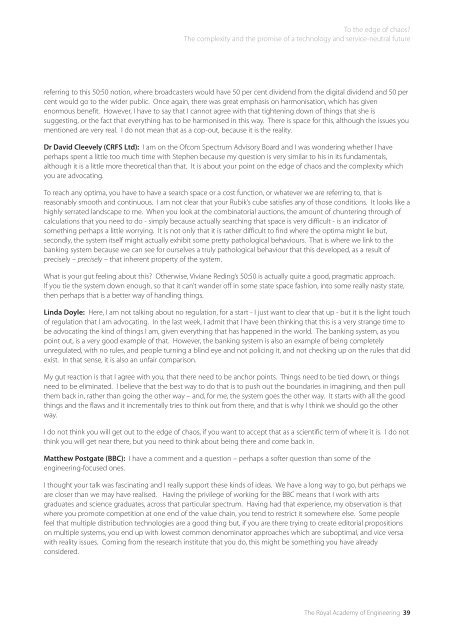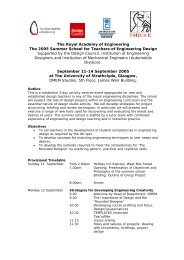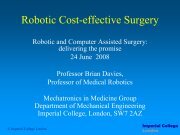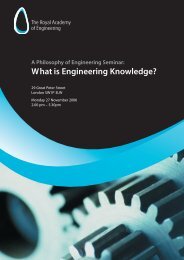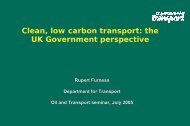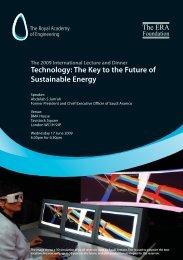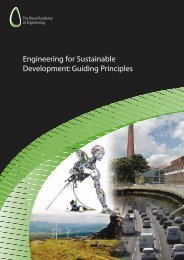Lecture Series in Mobile Telecommunications and Networks (1583KB)
Lecture Series in Mobile Telecommunications and Networks (1583KB)
Lecture Series in Mobile Telecommunications and Networks (1583KB)
Create successful ePaper yourself
Turn your PDF publications into a flip-book with our unique Google optimized e-Paper software.
To the edge of chaos?<br />
The complexity <strong>and</strong> the promise of a technology <strong>and</strong> service-neutral future<br />
referr<strong>in</strong>g to this 50:50 notion, where broadcasters would have 50 per cent dividend from the digital dividend <strong>and</strong> 50 per<br />
cent would go to the wider public. Once aga<strong>in</strong>, there was great emphasis on harmonisation, which has given<br />
enormous benefit. However, I have to say that I cannot agree with that tighten<strong>in</strong>g down of th<strong>in</strong>gs that she is<br />
suggest<strong>in</strong>g, or the fact that everyth<strong>in</strong>g has to be harmonised <strong>in</strong> this way. There is space for this, although the issues you<br />
mentioned are very real. I do not mean that as a cop-out, because it is the reality.<br />
Dr David Cleevely (CRFS Ltd): I am on the Ofcom Spectrum Advisory Board <strong>and</strong> I was wonder<strong>in</strong>g whether I have<br />
perhaps spent a little too much time with Stephen because my question is very similar to his <strong>in</strong> its fundamentals,<br />
although it is a little more theoretical than that. It is about your po<strong>in</strong>t on the edge of chaos <strong>and</strong> the complexity which<br />
you are advocat<strong>in</strong>g.<br />
To reach any optima, you have to have a search space or a cost function, or whatever we are referr<strong>in</strong>g to, that is<br />
reasonably smooth <strong>and</strong> cont<strong>in</strong>uous. I am not clear that your Rubik’s cube satisfies any of those conditions. It looks like a<br />
highly serrated l<strong>and</strong>scape to me. When you look at the comb<strong>in</strong>atorial auctions, the amount of chunter<strong>in</strong>g through of<br />
calculations that you need to do - simply because actually search<strong>in</strong>g that space is very difficult - is an <strong>in</strong>dicator of<br />
someth<strong>in</strong>g perhaps a little worry<strong>in</strong>g. It is not only that it is rather difficult to f<strong>in</strong>d where the optima might lie but,<br />
secondly, the system itself might actually exhibit some pretty pathological behaviours. That is where we l<strong>in</strong>k to the<br />
bank<strong>in</strong>g system because we can see for ourselves a truly pathological behaviour that this developed, as a result of<br />
precisely – precisely – that <strong>in</strong>herent property of the system.<br />
What is your gut feel<strong>in</strong>g about this? Otherwise, Viviane Red<strong>in</strong>g’s 50:50 is actually quite a good, pragmatic approach.<br />
If you tie the system down enough, so that it can’t w<strong>and</strong>er off <strong>in</strong> some state space fashion, <strong>in</strong>to some really nasty state,<br />
then perhaps that is a better way of h<strong>and</strong>l<strong>in</strong>g th<strong>in</strong>gs.<br />
L<strong>in</strong>da Doyle: Here, I am not talk<strong>in</strong>g about no regulation, for a start - I just want to clear that up - but it is the light touch<br />
of regulation that I am advocat<strong>in</strong>g. In the last week, I admit that I have been th<strong>in</strong>k<strong>in</strong>g that this is a very strange time to<br />
be advocat<strong>in</strong>g the k<strong>in</strong>d of th<strong>in</strong>gs I am, given everyth<strong>in</strong>g that has happened <strong>in</strong> the world. The bank<strong>in</strong>g system, as you<br />
po<strong>in</strong>t out, is a very good example of that. However, the bank<strong>in</strong>g system is also an example of be<strong>in</strong>g completely<br />
unregulated, with no rules, <strong>and</strong> people turn<strong>in</strong>g a bl<strong>in</strong>d eye <strong>and</strong> not polic<strong>in</strong>g it, <strong>and</strong> not check<strong>in</strong>g up on the rules that did<br />
exist. In that sense, it is also an unfair comparison.<br />
My gut reaction is that I agree with you, that there need to be anchor po<strong>in</strong>ts. Th<strong>in</strong>gs need to be tied down, or th<strong>in</strong>gs<br />
need to be elim<strong>in</strong>ated. I believe that the best way to do that is to push out the boundaries <strong>in</strong> imag<strong>in</strong><strong>in</strong>g, <strong>and</strong> then pull<br />
them back <strong>in</strong>, rather than go<strong>in</strong>g the other way – <strong>and</strong>, for me, the system goes the other way. It starts with all the good<br />
th<strong>in</strong>gs <strong>and</strong> the flaws <strong>and</strong> it <strong>in</strong>crementally tries to th<strong>in</strong>k out from there, <strong>and</strong> that is why I th<strong>in</strong>k we should go the other<br />
way.<br />
I do not th<strong>in</strong>k you will get out to the edge of chaos, if you want to accept that as a scientific term of where it is. I do not<br />
th<strong>in</strong>k you will get near there, but you need to th<strong>in</strong>k about be<strong>in</strong>g there <strong>and</strong> come back <strong>in</strong>.<br />
Matthew Postgate (BBC): I have a comment <strong>and</strong> a question – perhaps a softer question than some of the<br />
eng<strong>in</strong>eer<strong>in</strong>g-focused ones.<br />
I thought your talk was fasc<strong>in</strong>at<strong>in</strong>g <strong>and</strong> I really support these k<strong>in</strong>ds of ideas. We have a long way to go, but perhaps we<br />
are closer than we may have realised. Hav<strong>in</strong>g the privilege of work<strong>in</strong>g for the BBC means that I work with arts<br />
graduates <strong>and</strong> science graduates, across that particular spectrum. Hav<strong>in</strong>g had that experience, my observation is that<br />
where you promote competition at one end of the value cha<strong>in</strong>, you tend to restrict it somewhere else. Some people<br />
feel that multiple distribution technologies are a good th<strong>in</strong>g but, if you are there try<strong>in</strong>g to create editorial propositions<br />
on multiple systems, you end up with lowest common denom<strong>in</strong>ator approaches which are suboptimal, <strong>and</strong> vice versa<br />
with reality issues. Com<strong>in</strong>g from the research <strong>in</strong>stitute that you do, this might be someth<strong>in</strong>g you have already<br />
considered.<br />
The Royal Academy of Eng<strong>in</strong>eer<strong>in</strong>g 39


